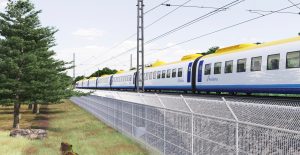Development of requirements for the 2nd-second stage of the Rail Baltica mainline construction procurement in Latvia announced is completed, and qualified candidates are invited to submit technical and financial offers. This milestone marks a significant step that has been taken so that the Rail Baltica mainline construction in Latvia can be started in 2023.
Entering the 2nd stage of the procurement, work continues with five construction companies’ associations. Development of requirements for this stage has an extra complexity considering that the works included in the procurement foresee infrastructure construction of the Rail Baltica mainline on the territory of Latvia outside the borders of the city of Riga – the railway base and superstructure – over a length of 200 km.
Construction works include site preparation, embankment, construction of railway bridges, roads and overpasses, relocation of engineering networks and construction of tracks. Construction works will not only combine many complex construction elements but will also be the largest construction of railway infrastructure in Latvia.
Requirements of the tender include experience gained from the previously carried out tenders for the construction of the Rail Baltica Central Hub and the station and surrounding infrastructure at Riga International Airport, as well as from other Rail Baltica tenders being carried out in other Baltic countries. The contract will be based on the FIDIC Red Book, an internationally recognized and globally used form of contract, applied in accordance with generally accepted practice to the implementation principles set out for the Rail Baltica global project.
 Considering that final Rail Baltica construction designs are still under development and are therefore not fully completed before the announcement of procurement’s 2nd stage, Eiropas Dzelzceļa līnijas – Rail Baltica national implementing body in Latvia and also the company in charge of organizing the tender – will apply the so-called re-measurement contract mechanism instead of lumpsum allowing that payments are made according to the volumes of the completed works, using unit prices and preventing overpayments. Also, based on the internationally spread early involvement method, the construction company will be involved already in the design phase.
Considering that final Rail Baltica construction designs are still under development and are therefore not fully completed before the announcement of procurement’s 2nd stage, Eiropas Dzelzceļa līnijas – Rail Baltica national implementing body in Latvia and also the company in charge of organizing the tender – will apply the so-called re-measurement contract mechanism instead of lumpsum allowing that payments are made according to the volumes of the completed works, using unit prices and preventing overpayments. Also, based on the internationally spread early involvement method, the construction company will be involved already in the design phase.
Requirements for the candidates are defined both for the starting and carrying out of the construction works, as well as for the commissioning of the infrastructure after several years of construction, demonstrating a long-term view on how the operations of the newly built railway could be started. In view of changing prices in the construction sector, an indexation mechanism is foreseen, which, given the current situation with material prices, will enable the contracting authority to avoid risks related to price fluctuation.
Candidates’ technical and financial proposals must be submitted by 31 October this year. The Procurement Commission will select the technically and economically most advantageous proposal. The evaluation criteria for the technical proposal also include such parameters as reducing the environmental impact of the expected works, such as reduction of emissions generated by the construction machinery, use of reusable materials, etc., as well as a choice of solutions that ensure long service life.
Following the completion of the tender, it is planned that construction works outside Riga will start in 2023, after the approval of construction designs of the specific stages. Construction works will be carried out in a priority manner – in the direction from Riga Airport to the Lithuanian border and from the Salaspils Intermodal Freight Terminal towards the direction of Lithuania. By implementing such a construction strategy, the European gauge connection will initially provide rail access to Riga Airport and the Salaspils Intermodal Freight Terminal, ensuring a connection with to Estonia in the next stage.
The first construction works are planned in Bauska Municipality near Iecava, where the future Rail Baltica infrastructure maintenance facility will be located. During the construction of Rail Baltica, this maintenance facility will be used as a construction logistics base, providing storage for construction materials, equipment, and construction machinery, as well as enabling the performance of the necessary preparation and processing work. A railway will be used to transport the construction materials by constructing a connection with the existing 1520 mm gauge network. With the construction logistics base in place, the next works are likely to start with the objects of the highest level of engineering and technical complexity – bridges over the Iecava and Mēmele rivers.
Please note that this tender is being held alongside an international tender for engineering consultancy and construction supervision services for the construction works of the Rail Baltica main line in Latvia.
